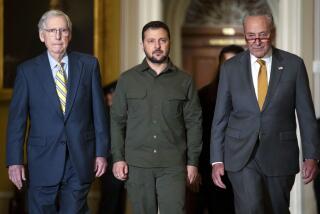A Hard March Through Campaign-Cash Jungle
- Share via
WASHINGTON — Two days after the 1996 elections, Sen. Russell D. Feingold was home in Middleton, Wis., surfing the TV channels in search of election analysis, when President Clinton called with a question that set his pulse racing.
After a mind-numbing discussion of the details of Feingold’s ambitious proposal to revamp the nation’s campaign-financing laws, the president dropped a bombshell.
“I’m thinking about calling a special session of Congress” to address the issue, Clinton confided, seeking Feingold’s reaction.
The Republican leadership won’t like it, thought Feingold, a Democrat who had been elected to the Senate only two years earlier. But why not give it a shot?
“It’d be a masterstroke,” he replied.
Maybe so. But Feingold will never have a chance to find out. And the reason says a lot about why the Senate left campaign finance reform for dead last week even though a huge majority of the voting public seems to favor it.
Just a few months after Clinton’s phone call, Feingold’s balloon was punctured when he mentioned the possibility of a special congressional session to Rahm Emanuel, a top Clinton advisor.
Emanuel knew nothing about such an idea. It was then that Feingold realized the president had dropped it--apparently without telling anyone on his staff that he had even suggested it. If that’s the case, Feingold wondered, how deep was Clinton’s commitment to the cause?
Such misunderstandings and unfulfilled promises would become the hallmarks of a roller-coaster year for Feingold and his chief ally, Sen. John McCain (R-Ariz.). They and their quixotic band of Senate insurgents set out to uproot an entrenched system awash in special-interest money that buys access, and maybe a lot more.
Their failure was no orphan. Wittingly or not, many individuals, special-interest groups and others--besides the Clinton White House--contributed to the demise of campaign finance reform. Public apathy also played a huge role.
But although the education of McCain and Feingold offers a lesson in the difficulty of cleaning up a system that favors the status quo, it also provided some uplifting moments.
One occurred last Monday as Sen. Susan Collins (R-Maine), a first-termer and co-sponsor of the McCain-Feingold bill, agonized over whether to fall in line behind the party leadership, which opposed it.
During her soul searching, Collins got a call that crystallized her thinking. Former Sen. Warren B. Rudman (R-N.H.), a longtime friend, knew she was under pressure from Senate Majority Leader Trent Lott (R-Miss.) to vote the party line. But he also knew she did not want to cast a vote that would effectively kill her own bill.
Referring to her fellow Senate Republicans, most of whom were aligned against her, many of them angrily so, Rudman said: “Remember, not one of them voted for you.” Hours later, Collins announced that she would vote against Lott. It is the people of Maine, she explained, to whom “I owe my ultimate allegiance.”
All but obscured in the reformers’ rhetoric about selling out to the special interests were the carefully considered arguments of some reform opponents. Sen. Mitch McConnell (R-Ky.) assembled a powerful array of organizations on both ends of the political spectrum to attack the McCain-Feingold restrictions on campaign donations and spending as gross violations of the 1st Amendment’s guarantee of free speech.
Portrayed by many as the Darth Vader of campaign finance reform, McConnell displayed a refreshing candor, making no apologies for his stance.
“McConnell’s a stand-up guy,” McCain said. “I admired the fact that he comes out and says, ‘This is my position.’ ” As the debate opened, the two shook hands and vowed not to get personal.
Clinton also contributed to the outcome by calling for campaign finance reform in the 1996 presidential campaign, only to find his credibility undermined by an avalanche of revelations of Democratic fund-raising irregularities during his reelection campaign.
He not only failed to convene a special session of Congress but also did not fully deliver on a promise that he would mount a full-court press for reform.
Nor did McCain and Feingold succeed in building a groundswell of public support. Without it, McCain said, “people [in power] just didn’t want to change a system that keeps incumbents in office.”
Their bill was given just two days of debate during the middle of the 1996 election campaign before it was buried.
The chances for action seemed much improved in 1997 as emerging fund-raising scandals gave reform a higher public profile. But as McCain and Feingold were girding for battle, McConnell and his forces began marshaling an odd-couple alliance whose members ranged from the Right to Life Committee and the Christian Coalition to the American Civil Liberties Union.
*
McCain and Feingold joined forces with reform-minded groups such as Common Cause, a citizens advocacy group, to launch Project Independence. On a slate-gray day in late March, reformers stood outside Boston’s Faneuil Hall as Common Cause President Ann McBride promised to gather, by the Fourth of July, 1,776,000 citizens’ signatures on petitions demanding reform.
She didn’t come close. Last Monday, three months late, she delivered barely a million signatures.
For McCain and Feingold, the inside game was more encouraging. Privately ridiculed for months by Republicans for having only one other Republican (Fred Thompson of Tennessee) on board as a co-sponsor, they leaned hard on Collins, who had been elected on the same day that Maine voters approved a far-reaching reform initiative providing candidates with public financing.
GOP leaders leaned back. But Collins signed up with the reformers in May, facetiously wondering if she would be consigned to the “pariah’s table” at the weekly Tuesday lunches of GOP senators.
Meanwhile, Clinton named former Vice President Walter F. Mondale, a Democrat, and ex-Sen. Nancy Kassebaum Baker (R-Kan.) to lead an effort to mobilize public opinion. Mondale and Kassebaum in turn persuaded three former presidents--Gerald R. Ford, Jimmy Carter and George Bush--to issue a call for reform.
When that didn’t do the trick, the reformers tried hardball. Just before Congress’ August recess, McCain, Feingold, Collins and several others announced that, by September, they would begin disrupting floor proceedings to force a debate on their bill.
Before going public with the threat, they met again with Emanuel.
“We wanted to make sure that the White House was on board. I remember pressing him on it,” Collins recalled. “And he said that it would be an all-out commitment.”
But little happened after that, “and that’s when I started doubting the depth of [Clinton’s] commitment,” Collins added. “This is a president with enormous popularity. If he went on television and said, ‘I need your help to get this done; please contact your senator,’ I think that would have had enormous impact. He has not made a difference on this issue.”
Responding, Emanuel noted that Clinton often called publicly for reform and privately lobbied Republican senators as the final showdown neared. “I feel quite comfortable with what we’ve done,” Emanuel said.
The stage was set a few weeks ago when Senate Minority Leader Tom Daschle of South Dakota suddenly announced that all 45 Senate Democrats were prepared to vote for the McCain-Feingold bill. And the bill gained another co-sponsor, Sen. Arlen Specter (R-Pa.), bringing the total number of supporters to 49--just one shy of the number needed for passage.
*
Clinton stepped up the pressure by saying he might call a special session of Congress if it adjourned without a meaningful debate on the McCain-Feingold bill.
Soon after, Lott agreed to bring up the McCain-Feingold bill for action--a huge step forward for the reformers. He also caught the opposition off guard by announcing on a Thursday evening that debate would commence the next day.
When he called up the measure, Lott proposed an amendment that he thought would poison the bill for Democrats: a restriction on labor unions’ ability to contribute members’ dues to political candidates.
But his ploy nearly backfired when half a dozen or so Republicans seemed on the verge of joining the Democrats in killing the Lott amendment, which might have dramatically shifted the debate’s momentum. Instead, Lott invoked more parliamentary procedures and prevented an up-or-down vote on his own amendment.
McCain vehemently protested that Lott had promised such a vote. Lott told McCain he had not.
“So it was a ‘misunderstanding,’ ” McCain said later, measuring his words carefully. “It was one of those things that’s kind of typical around here--you get into frantic negotiations when you’ve got an absolute deadline to meet.”
Without a clear judgment on his amendment, Lott declared a legislative stalemate and ended debate on the McCain-Feingold bill.
“Campaign finance reform is not going to pass this year,” he said.
“It’s impossible.”
* Times staff writer Elizabeth Shogren contributed to this story.
More to Read
Get the L.A. Times Politics newsletter
Deeply reported insights into legislation, politics and policy from Sacramento, Washington and beyond. In your inbox twice per week.
You may occasionally receive promotional content from the Los Angeles Times.










